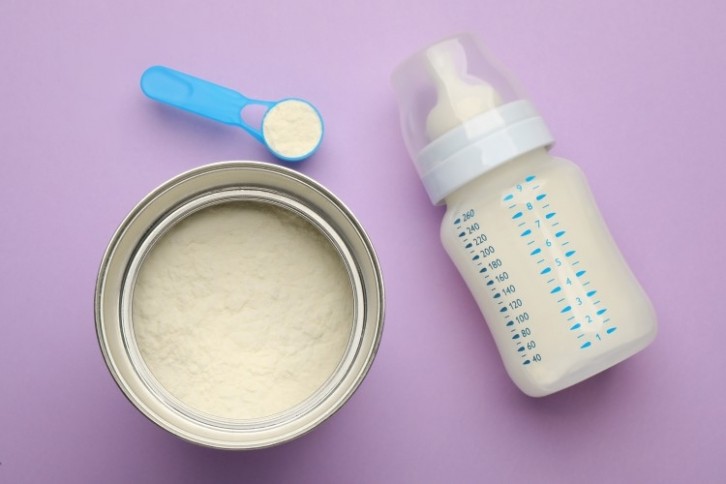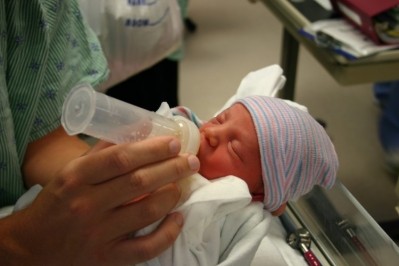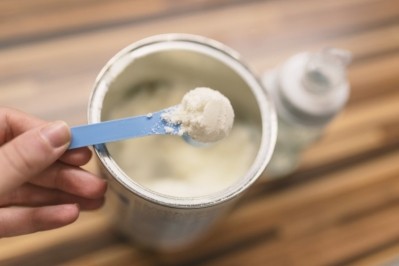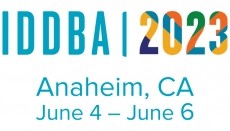FDA issues warning letters to ByHeart, Reckitt and Perrigo over ‘significant’ code violations

The warning letters are part of the Food and Drug Administration’s normal regulatory process and are designed to urge manufacturers to take extra steps in order to minimize the risk of cross-contamination in their supply chains. FDA’s actions are part of its ongoing efforts to strengthen the safety and resiliency of the US infant formula industry and to prevent a repeat of the shortages of 2022, when Abbott Nutrition halted production at the nation’s largest baby powder plant.
FDA is not advising consumers to discard or avoid any particular infant formula product as it believes the recalls initiated by the three firms had been effective in removing any potentially contaminated product from the market.
ByHeart, Reckitt/Mead Johnson and Perrigo Wisconsin, Inc. all issued voluntary product recalls – in December 2022, February 2023 and March 2023 respectively – after releasing formula that could have been contaminated with Cronobacter sakazakii, a common environmental pathogen. The measure was precautionary and none of the recalled products tested positive for the bacteria. However, FDA has highlighted that the recalled formula – which had been part of production runs that returned a positive result for the pathogen – should not have been released commercially in the first place.
All three manufacturers have since applied a range of ‘corrective actions’ as told by the FDA, and the warning letters indicate the regulator’s outstanding concerns.
In December 2022, ByHeart recalled Whole Nutrition Infant Formula, Milk Based Powder with Iron for 0-12 Months in 24oz containers, due to potential cross-contamination with Cronobacter sakazakii at a third-party packager’s facility. None of the distributed product tested positive for any contaminants. ByHeart owns its entire manufacturing supply chain except of final canning, where the contamination was suspected to have happened.
In February 2023, Reckitt recalled two batches (around 145,000 cans) of ProSobee 12.9oz Simply Plant-Based Infant Formula due to possible cross-contamination with Cronobacter sakazakii. All product underwent ‘extensive testing’ and the results came back negative for the bacteria. Reckitt later announced the root cause had been linked to a material from a third party and that the company had taken ‘all appropriate corrective actions, including no longer sourcing this material from the supplier’.
In March 2023, Perrigo recalled several lots of Gerber GoodStart SoothePro Powdered Infant Formula that were manufactured in the company’s Wisconsin facility over concerns regarding Cronobacter sakazakii presence. No distributed product tested positive for the bacteria.
From ‘standing piles of spilled formula’ to water leaks: The corrective actions FDA is seeking
The letters - which have been published in full online – list ‘significant’ code violations committed by each of three companies. Notably, the regulator is not satisfied with the firms’ root-cause investigations, which did not involve whole genome sequence testing of the finished product isolates or the production environment - actions that would have helped to narrow down the source of the contamination.
FDA also questions the companies’ rationale for releasing product that had been part of the same manufacturing run as a contaminated product they had known about. According to the regulator, when Cronobacter is detected in a finished infant formula product that is part of a continuous production run, all product prepared, packed, or held under the same ‘insanitary conditions’ as the positive batch is deemed ‘adulterated’.
In a letter addressed to Perrigo Wisconsin, Inc. vice-president of quality operations Bart D. Shrode, the FDA acknowledges that the company had already taken a range of measures, including investigational swabbing, cleaning and sanitizing activities, but had not been ‘proactive’ in addressing resident strains present in the facility. However, the agency says the firm had not established a system of process controls covering all stages of processing and wants Perrigo to review its sanitation and hygienic control procedures further.
The investigation only refers to Perrigo’s Wisconsin facility, which it acquired from Nestlé in November 2022. The letter revealed that the bacteria was detected twice before at the Wisconsin plant, in March and November 2022. FDA found two different strains of Cronobacter sakazakii at the plant following an inspection in March 2022, and the same strains were detected again in March 2023. This was ‘indicative of resident pathogens or harborage sites’ in the facility, according to the regulator.
In November 2022, Perrigo identified the bacteria in more than 20 locations, but only after the company had been notified that its finished product had tested positive, prompting the firm to raise its environmental monitoring program to ‘maximum control’ and carry out additional environmental testing. But the company did not carry out more advanced tests such as whole genome sequence testing, and its monitoring program does not specify what corrective actions should be taken when pathogens are detected in the premises, FDA noted.
The regulator found similar issues with Reckitt/Mead Johnson’s procedures, stating the firm hadn’t established a system of process controls covering all stages of processing at its Zeeland facility; FDA also found ‘deficiencies’ in how the company conducted its root-cause analysis.
According to the warning letter, Reckitt hadn’t carried out its own investigation of the third-party customer’s root cause analysis and had failed to consider other potential sources of contamination, including ‘a history of several internal cracks of varying lengths…throughout your dryer system, multiple water leaks…, or the standing piles of spilled infant formula product’ at its own plant.
As a result, the FDA wants the manufacturer to provide details on how the firm would carry out an independent investigation of a third-party’s root cause analysis, and how it would evaluate its own sanitation and hygienic control activities. The company has agreed to review its swab-collection protocols and keep records for all pending, ongoing and completed maintenance work.
ByHeart has also been criticized for not taking additional efforts to evaluate other sources of contamination that could have contributed to the positive result that prompted the recall. In a letter addressed to the company’s CEO Ron Belldegrun, the FDA states the company ‘did not work with [its] third-party contract manufacturer to further investigate the origin(s) or root cause(s) of the finished product positive findings’.
As with the other two manufacturers, FDA told ByHeart that performing whole genome sequencing analysis would have offered additional insight into the origin of the contamination. There were other gaps in the root cause analysis too, including that it failed to consider if a rainwater leak in the processing room – an area that tested positive for the bacteria – could have contributed to the contamination.
ByHeart has since agreed to carry out whole genome sequence testing on all product and environmental areas that had tested positive for Cronobacter, Listeria and Salmonela, a commitment the agency has ‘applauded’. The manufacture has also told FDA it would use a third-party auditor to determine gaps in the manufacturer’s environmental monitoring program, and has addressed FDA’s concerned around water leaks, including by repositioning the main inlet burner louvers frame and disposing of the skylight dome that had been leaking into the processing area.
FDA’s prevention strategy at work
The letters highlight the lengths at which the FDA is going in order to prevent a repeat of 2022’s infant formula shortage, which was triggered by a large-scale recall by Abbott after five strains of Cronobacter was found at its manufacturing plant.
The regulator has remained upbeat about the state of the US infant formula supply, stating that in-stock rates are at 85% or higher since the start of 2023. These warning letters are not associated with any current recalls and therefore the FDA does not anticipate any impact to the availability of infant formula on the market, the agency stressed.
Responding for a request for comment, Perrigo told us: “For over 130 years, Perrigo has been committed to meeting the needs of consumers, parents and caregivers - and the quality and safety of our products is our highest priority. We have rigorous procedures throughout our infant formula manufacturing processes and every batch of infant formula is tested to ensure it meets stringent nutritional, safety, quality, and U.S. Food & Drug Administration regulatory requirements.
“On August 30, 2023, three infant formula manufacturers, including Perrigo, received a Warning Letter from the FDA. The letter Perrigo received pertained only to its infant formula manufacturing facility located in Wisconsin, which Perrigo acquired from Nestlé on November 1, 2022. This letter relates to a routine inspection by the FDA which began on March 6, 2023 and references FDA’s March 8, 2023 communication to the infant formula industry outlining its evolving regulatory expectations. We are in the process of carefully reviewing FDA’s letter and plan to work closely with the agency.
“As noted in the FDA’s press release, we want to assure the public that all of Perrigo’s infant formula products available to parents and caregivers are safe for infant feeding, and FDA does not advise discarding or avoiding purchase of any particular infant formula.”
Reckitt/Mead Johnson Nutrition said in a statement: “At Reckitt/Mead Johnson Nutrition, the safety of babies is of the utmost importance to us and we can confirm that all of our infant formula products continue to meet the highest FDA standards for safety and quality.
“The FDA’s communication is part of its enhanced regulatory oversight and does not relate to any new concerns or issues, as they reflect findings from previous inspections. We take this very seriously and have been in an ongoing dialogue with the agency regarding our commitment to ensure that our manufacturing represents the highest standard in the industry.
“There are no safety or quality concerns with any Reckitt / Mead Johnson formula. Parents and caregivers can rest assured, our products can be used with confidence, and they don’t need to do anything differently when shopping or feeding their infants.
“Infant formula safety is our top priority, and we are confident in the rigor of the programs we have in place to ensure the safety of every infant formula product we ship.”
ByHeart is yet to respond to our request for comment.












